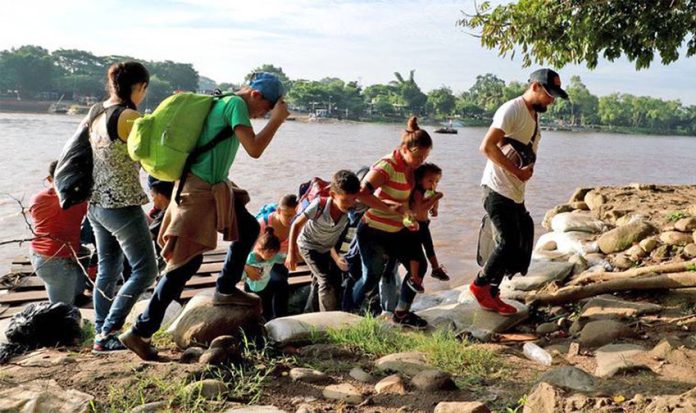Doctors Without Borders (MSF) has warned of increased violence against migrants and refugees on Mexico’s southern border.
In a report published Wednesday, MSF said that teams working in Tenosique, Tabasco – which borders Guatemala – have reported an increase in kidnappings and an escalation of violence against people who have entered Mexico en route to the United States.
MSF staff providing medical and psychological care have heard accounts from migrants of abductions, torture, extreme violence, cruel treatment and sexual assault for extortion purposes, the report said. The violence begins as soon as migrants cross the border into Mexico from Guatemala, it added.
The organization said that in less than a month it has treated 11 migrants in Tenosique who were victims of kidnapping and torture, a figure that is the same as the total number of kidnapping cases treated by MSF in the same town in the first eight months of the year.
“What we are seeing is an exponential growth in the number of kidnappings in this area and an increase in the cruelty and the torture methods used by criminal groups . . .” said Gemma Pomares, MSF’s head of medical activities in Tenosique.
“MSF has provided medical support in Tenosique . . . for four years. While violence has always been a reality of the migration route north from Guatemala through Mexico, extortion and this level of extreme violence have been more pervasive in dangerous cities closer to the U.S. border, and has not been so prevalent, until now, in southern areas,” she added.
Migrants have been shot, stabbed and subjected to sexual abuse and torture including electric shocks to the genitals and anus, Pomares said. Several migrants told MSF that they were forced to watch as their companions were raped.
A number of migrants said they had been taken to abandoned houses where they were forced to remove their clothes before being tied up outside for hours in high temperatures.
They were left there until they provided phone numbers of family members, presumably so that criminal groups could demand extortion payments.
MSF warned that the federal government’s policies of “criminalization, persecution, detention and deportation, in order to contain migratory flows to the U.S., have forced migrants to go underground and take increasingly dangerous routes.”
As a result, more migrants are exposed to criminal groups that “operate with impunity throughout the region and in particular on the route from Guatemala to Tenosique,” the organization said.
To stave off a tariff threat from United States President Donald Trump, the government agreed in June to deploy the National Guard to increase enforcement against illegal migrants. Migrant advocates have previously warned that the move would cause migrants to take more dangerous routes to the northern border.
Sergio Martín, MSF’s general coordinator in Mexico, said “it was a just matter of time before the high levels of violence against migrants and refugees that our teams have seen on the northern border, moved to the south of the country.”
He added, “. . . what we are seeing are the humanitarian consequences of the tightening of immigration policies, designed to inflict greater suffering on the thousands of people desperately escaping for their lives.”
Jan Jarab, the Mexico representative of the United Nations High Commissioner for Human Rights, also criticized the government’s immigration policy this week, stating that it was a backward step from earlier efforts to protect migrants’ rights.
When the federal government first took office it made an “attempt” to treat migrants humanely and respect their rights, Jarab said at a regional immigration forum in Mexico City.
“. . . But given the international circumstances [Trump’s tariff threat] it only survived a few months and today we have migrants locked up again,” he added.
The UN official said that he has concerns about the conditions in Mexico’s migrant detention centers, many of which are overcrowded, and said there have been cases in which children’s rights have been abused.
Ana Saiz, president of the migrant advocacy organization Sin Fronteras, said there are an estimated 150,000 migrants in 53 immigration stations across the country and an additional 50,000 people who are waiting in Mexico for their asylum claims in the United States to be decided.
To appease the United States, the government also agreed to an expansion of the so-called “Remain in Mexico” policy that forces migrants who entered the U.S. via Mexico to return to this country until immigration courts rule on the validity of their asylum claims.
A number of organizations, including MSF and Human Rights First, have warned that the policy subjects migrants to a number of dangers in Mexico’s border cities.
The latter group said 343 cases had been identified in which asylum seekers returned to Mexico had been “violently attacked or threatened.”
Some migrants reported they had been kidnapped or raped.
Acting U.S. Homeland Security Secretary Kevin McAleenan said that President Trump was “using every tool available to address the humanitarian crisis at the border” and that “Remain in Mexico” was “an essential part of these efforts.”
He insisted that he was “confident in the program’s integrity.”
Some observers have concluded that Mexico’s concessions to the United States on immigration policy have turned Mexico into Trump’s long-promised border wall.
Saiz, the migrants’ advocate, claimed that never before has Mexico had “such a violent policy towards migrants.”
Source: Newsweek (en), Europa Press (sp), La Jornada (sp)
